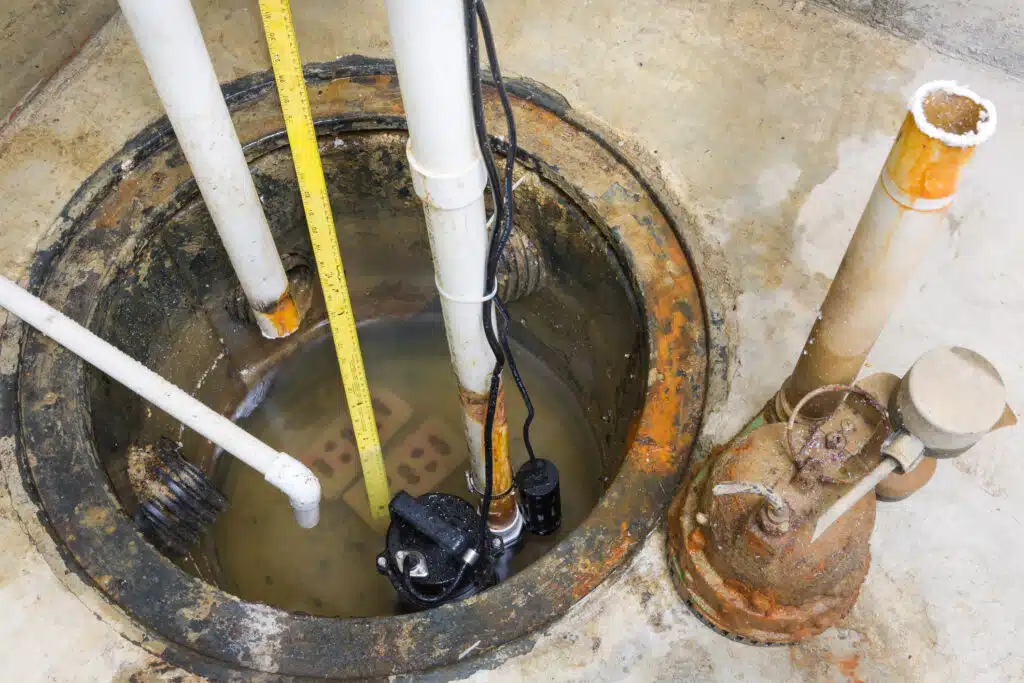Understanding the significance of sump pump testing in your home cannot be overstated, especially for residents of Lancaster, PA, and its surrounding areas like York and Harrisburg. This crucial maintenance task is often overlooked, yet it plays a pivotal role in preventing potential flooding and water damage. Regular sump pump testing ensures that this vital system is ready to spring into action during heavy rains or sudden water ingress, safeguarding your basement and home’s foundation from costly damage.
For homeowners in regions prone to wet weather, such as York, PA, the importance of keeping your sump pump in optimal condition through regular testing becomes even more pronounced. It’s not just about reacting to weather forecasts but being proactively prepared. Ensuring your sump pump is functioning correctly can be the difference between a dry basement and one susceptible to mold, mildew, and structural issues.
In Harrisburg, PA, where weather can be unpredictable, sump pump testing should be a routine part of your home maintenance schedule. This simple yet effective procedure can save you a significant amount of time and money in the long run. By identifying and addressing any issues early, you can avoid the stress and financial strain of emergency repairs during critical times.
Therefore, incorporating sump pump testing into your regular home maintenance routine is a wise decision for any homeowner. It’s not just about preventing immediate water damage; it’s about ensuring the longevity and safety of your home. With regular testing, you can rest easy knowing that your sump pump will function efficiently when you need it most, keeping your home dry and protected year-round.
Understanding the Role of Your Sump Pump
Understanding the role of your sump pump begins with recognizing its function in your home’s defense against water intrusion. This device, often located in the lowest part of your basement, acts as a first line of defense against flooding. By efficiently moving water away from your home, it prevents the accumulation that leads to water damage and mold growth. For residents in York, PA, where heavy rains can occur, this is particularly crucial.
Testing your sump pump regularly ensures it’s always in working order, a simple yet vital practice. When you test the pump, you’re checking not just its operational status but also its ability to respond in an emergency. This proactive approach can highlight potential issues before they escalate into costly problems. In Harrisburg, PA, where weather patterns can be unpredictable, such diligence offers peace of mind.
The process of sump pump testing is straightforward and can be done without professional help. It involves pouring water into the sump pit to trigger the pump and watching how effectively it expels the water. If the pump activates promptly and drains the water quickly, it’s likely in good condition. However, any hesitation or failure to activate signals the need for maintenance or repair.
Regular sump pump testing is an essential aspect of home maintenance that should not be overlooked. It not only ensures your pump’s readiness for wet weather but also extends its lifespan, saving you money in the long run. By making sump pump testing a part of your routine, you protect your home from potential flooding and water damage, securing your peace of mind regardless of the forecast.

The Consequences of Neglecting Sump Pump Testing
Neglecting sump pump testing can lead to severe consequences for homeowners, especially in areas prone to heavy rainfall like York, PA. Without regular checks, a sump pump may fail to operate during a critical moment, resulting in water flooding your basement. This oversight can cause extensive damage to flooring, walls, and any stored belongings. Consequently, the cost of repairs and replacements can quickly add up, making regular testing a financially wise routine.
In Harrisburg, PA, where weather can shift unexpectedly, the risks associated with a non-functional sump pump are even higher. Ignoring sump pump testing can also lead to more insidious problems like mold and mildew growth. These issues not only affect the structure of your home but can also pose health risks to your family. Therefore, ensuring your sump pump is in working order is crucial for both your home’s integrity and your family’s well-being.
Moreover, a malfunctioning sump pump can significantly decrease your home’s value. Prospective buyers are likely to be deterred by the potential for water damage and the associated costs of mitigating mold and repairing structural damage. Regular sump pump testing signals to potential buyers that the home has been well-maintained, potentially increasing its market value.
Finally, insurance companies may not cover damage caused by neglecting sump pump maintenance. Regular sump pump testing can be a preventative measure that saves you from facing high out-of-pocket expenses for repairs. It’s a simple step that can prevent a multitude of problems, ensuring that your home remains a safe and dry haven no matter the weather conditions.
How Often Should You Perform Sump Pump Testing?
To ensure your sump pump remains in optimal condition, testing it at least once every three months is advisable. This frequency allows you to catch any potential issues before they escalate into bigger problems. Especially in areas like York, PA, where heavy rains are common, staying ahead of maintenance can make all the difference. Regular checks keep your sump pump ready for sudden downpours, ensuring your basement stays dry.
In addition to quarterly tests, it’s crucial to perform a test before the onset of heavy rain seasons. Doing so provides an extra layer of security, confirming your sump pump’s readiness for increased activity. For residents in Harrisburg, PA, where weather patterns can shift unexpectedly, this precautionary step is particularly important. It’s a simple measure that can spare you from the headaches of water damage repair.
Another opportune time for sump pump testing is after a storm or significant rainfall. Checking your pump’s performance post-event can reveal if it’s been compromised or needs attention. This proactive approach not only extends the life of your sump pump but also ensures it continues to protect your home effectively. It’s a straightforward task that can prevent future issues, offering peace of mind.
Lastly, if you notice any unusual noises or vibrations from your sump pump, test it immediately. These signs could indicate a malfunction or obstruction that needs to be addressed. Ignoring these warnings can lead to failure when you least expect it, putting your home at risk of flooding. Prompt action and regular sump pump testing safeguard your home, maintaining its integrity and comfort.
Step-by-Step Guide to Sump Pump Testing
Testing your sump pump is a straightforward process that any homeowner can perform. Start by locating the sump pump in your basement and ensure it’s plugged in and operational. Next, slowly pour several gallons of water into the sump pit until the pump activates. This mimics the conditions of heavy rainfall or melting snow, ensuring your pump reacts as it should.
Observing how the sump pump handles the water is crucial. If it quickly and efficiently pumps the water out, your system is likely in good shape. However, if the pump struggles to activate or doesn’t remove the water effectively, it may require maintenance or replacement. This simple test can reveal potential issues before they escalate, saving you from future headaches.
For homeowners in York, PA, where weather can be unpredictable, adding a visual inspection of the pump and its components is a wise step. Check for any signs of wear, damage, or obstruction that could impair the pump’s function. Ensure the discharge line is clear and free of debris to facilitate smooth operation. This preventive measure can significantly extend the life of your sump pump.
Finally, it’s beneficial to listen for any unusual noises during sump pump testing. Odd sounds can indicate problems like a jammed impeller or a failing motor. Residents in Harrisburg, PA, should be particularly vigilant about these signs. Addressing such issues promptly ensures your sump pump remains reliable, safeguarding your home against water damage.
Identifying Common Sump Pump Problems During Testing
During sump pump testing, one common issue you might discover is the pump failing to activate. This problem often results from a power supply issue or a malfunctioning float switch. In York, PA, where sudden storms are a concern, ensuring your sump pump’s electrical connections and float switch are in working order is essential. A non-responsive pump can quickly lead to flooding, especially during heavy rainfall.
Another frequent problem identified through sump pump testing is a pump that runs continuously. This could indicate a stuck switch or a faulty check valve. Homeowners in Harrisburg, PA, facing such issues should address them promptly to avoid overworking the pump. Continuous operation can lead to premature wear and failure, leaving your basement vulnerable to water damage.
Clogs and blockages in the sump pump or discharge line are also common concerns. Debris like leaves, stones, or small objects can obstruct the water flow, reducing the pump’s efficiency. Regularly clearing the sump pit and checking the discharge line for obstructions during sump pump testing can prevent such issues. Maintaining clear pathways is crucial for the pump to function correctly and efficiently remove water from your home.
Lastly, noise during operation is a sign that should not be ignored. Strange noises can indicate a jammed impeller or a failing motor, which requires immediate attention. Identifying and addressing these sounds early on during sump pump testing can save you from costly repairs or replacements. Keeping an ear out for any unusual sounds ensures your system remains reliable, protecting your home from potential flooding.
Professional vs. DIY Sump Pump Testing
When considering sump pump testing, homeowners often weigh the benefits of professional services against the feasibility of doing it themselves. In York, PA, where heavy rainfall can occur without much warning, having a professional assess your sump pump might offer more thorough insights. Professionals come equipped with the tools and knowledge to identify less obvious issues, ensuring your system operates at peak efficiency. This level of expertise can be particularly valuable for complex systems or when homeowners are not comfortable performing the test themselves.
On the other hand, DIY sump pump testing is a practical option for many, especially for routine checks. It allows homeowners in Harrisburg, PA, to quickly verify their pump’s functionality without waiting for a professional. This immediacy can be crucial in preparing for imminent weather events. Additionally, familiarizing oneself with the sump pump’s operations through regular testing can empower homeowners, making them more adept at recognizing early signs of trouble.
However, it’s important to recognize when a situation calls for professional intervention. If during a DIY test, the pump exhibits persistent issues, such as failing to activate or making unusual noises, calling in a professional is advisable. Experts can diagnose and resolve complex problems that might not be apparent to the average homeowner. Their skills are especially beneficial for addressing issues that could lead to significant water damage if not properly fixed.
Ultimately, the choice between professional and DIY sump pump testing should consider the homeowner’s comfort level, the complexity of the system, and the potential risk of water damage. Regular testing, whether conducted by a professional or the homeowner, remains essential in maintaining a dry and safe basement. By staying proactive, homeowners can protect their property from the costly and stressful consequences of flooding.
Enhancing Your Home’s Safety with Regular Sump Pump Testing
Regular sump pump testing is a key step in enhancing your home’s safety, especially in areas like York, PA, where rainfall can be unpredictable. By checking your sump pump’s functionality regularly, you ensure it’s ready to handle any amount of water. This proactive measure not only prevents flooding but also protects your home’s structure from water damage. It’s a simple, effective way to keep your basement dry and your peace of mind intact.
In Harrisburg, PA, homeowners understand the value of a well-maintained sump pump. Testing it regularly helps identify any potential issues before they escalate into bigger, more costly problems. Whether it’s a stuck switch or a clogged discharge line, early detection makes all the difference. This approach saves you time and money, avoiding emergency repairs when you least expect them.
Moreover, regular sump pump testing contributes to the overall longevity of your system. By ensuring that all components are working as they should, you extend the life of your sump pump. This not only means fewer replacements over time but also a more reliable defense against water intrusion. A well-maintained sump pump is a cornerstone of a safe, dry basement.
Finally, incorporating sump pump testing into your routine home maintenance schedule is a smart move for any homeowner. It’s a straightforward task that offers significant benefits, from protecting your property to ensuring your family’s health by preventing mold growth. Regular testing is an essential practice that underpins the safety and comfort of your home, no matter the weather.
Preparing for the Unexpected: The Value of a Backup System
Understanding the need for regular sump pump testing is crucial, but preparing for the unexpected by having a backup system in place offers an additional layer of security. In York, PA, where heavy rains can surprise residents, a backup sump pump ensures that your home stays dry, even if the primary pump fails or power outages occur. This redundancy is not just about having a plan B; it’s about ensuring continuous protection against water damage under all circumstances. Investing in a backup system can save you from the stress and costs associated with basement flooding.
Sump pump testing is vital for both your primary and backup systems. Regular checks allow you to verify that each component of your sump pump setup is operational and energy-efficient. For homeowners in Harrisburg, PA, testing both systems before the rainy season hits can be the difference between a dry basement and costly water damage. It’s a proactive approach that ensures both your primary and backup pumps are ready to handle whatever weather comes your way.
The value of a backup sump pump system extends beyond just emergency preparedness; it also contributes to the overall resilience of your home’s defenses against water intrusion. A well-maintained primary system, complemented by a reliable backup, offers peace of mind that your property is protected around the clock. This dual-layer protection is especially important in areas prone to sudden and severe weather changes, where the likelihood of sump pump overuse or failure is higher.
Lastly, incorporating the testing of both your primary and backup sump pump systems into your regular home maintenance schedule is a smart strategy. This not only ensures the functionality of your sump pumps but also extends their lifespan, reducing the need for frequent replacements. By staying vigilant and proactive in sump pump testing, you safeguard your home against unexpected weather, keeping your basement dry and your mind at ease.

Frequently Asked Questions
Why test your sump pump regularly?
Testing your sump pump regularly ensures it’s ready to prevent flooding. Over time, parts can wear out or clog, leading to failure. Regular checks help identify issues early, avoiding costly water damage. This simple step keeps your home safe and dry, especially during heavy rains.
How often should sump pump testing occur?
Experts recommend testing your sump pump every three months to ensure it’s in top working condition. This frequent check-up can catch issues before they lead to bigger problems. During rainy seasons or times of heavy snow melt, more frequent testing might be wise. Keeping a regular testing schedule helps protect your home from water damage effectively.
What are signs of sump pump failure?
Signs of sump pump failure include odd noises, such as grinding or rattling, indicating a malfunction. If the pump runs non-stop or doesn’t activate during heavy rainfall, it’s likely not working properly. Water pooling in the sump pit without being pumped out is another clear warning. Regular sump pump testing can catch these issues early, ensuring your home stays dry and secure.
What tools are needed for Sump Pump Testing?
For sump pump testing, you only need a few simple tools. A bucket of water is essential to simulate rainfall and check the pump’s activation. You’ll also want a flashlight to inspect the sump pit and pump for any debris or blockages. Lastly, having a pair of gloves can keep your hands clean and safe during the process. These basic items make testing your sump pump easy and effective.
Can heavy rain affect sump pump performance?
Heavy rain can indeed impact how well your sump pump works. During intense storms, the pump may struggle to manage the increased water flow. This situation can lead to overworking the pump, potentially causing it to fail when you need it most. Regular sump pump testing ensures it’s ready to handle these wet conditions efficiently.









